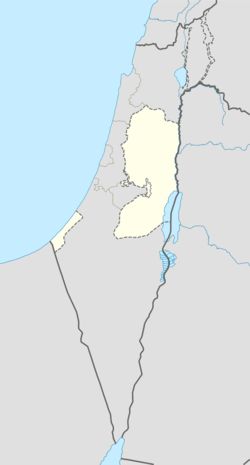Jubbet ad-Dib
| Jubbet ad-Dib | |
|---|---|
| Other transcription(s) | |
| • Arabic | جبة الذيب |
| • Also spelled |
Jubbet adh-Dhib (official) Jub al-Dib (unofficial) |
 Jubbet ad-Dib Location of Jubbet ad-Dib within Palestine | |
| Coordinates: 31°40′54″N 35°14′31″E / 31.68167°N 35.24194°ECoordinates: 31°40′54″N 35°14′31″E / 31.68167°N 35.24194°E | |
| Palestine grid | 173/119 |
| Governorate | Bethlehem |
| Founded | 1929 |
| Government | |
| • Type | Local Development Committee |
| • Head of Municipality | Riad Khamis[1] |
| Area | |
| • Jurisdiction | 402 dunams (0.4 km2 or 0.2 sq mi) |
| Population (2007[2]) | |
| • Jurisdiction | 162 |
| Name meaning | "the Well of Wolves" |
Jubbet ad-Dib (Arabic: جبة الذيب, also spelled Jubbet adh-Dhib) is a small Palestinian village in the central West Bank, part of the Bethlehem Governorate. It is located about 6.5 kilometers southeast of Bethlehem and is just east of the Palestinian town of Jannatah and north of the Israeli settlement Kfar Eldad.[3] It had a population of 162 according to the 2007 census by the Palestinian Central Bureau of Statistics (PCBS).[2] Jubbet ad-Dib has a total land area of 402 dunams, of which 8 constitute as built-up area, and is situated at an altitude of 628 meters above sea level.[3]
History
The village was established in 1929 by Bedouin Arabs who had previously lived and grazed their livestock there.[3] The inhabitants were part of the Bani Harb tribal confederation based in the Arabian Peninsula.[3] The village name translates as "the Well of the Wolves." Currently, Jubbet ad-Dib's population mostly belong to one clan, al-Wahsh. There is one mosque in the village, the Hamza Bin Abd al-Muttalib Mosque.[3]
In 2002 the Palestinian National Authority (PNA) established a five-member local development committee to administer Jubbet adh-Dhib. The PNA appoints all members and there is no headquarters for the committee in the village itself.[3] In recent years the village has relied on the leadership of the Women's Committee, which has successfully found international donors of a school, a school bus, a solar heating system, and solar electricity.[4][5]
Economy and infrastructure
About 70% of Jubbet ad-Dib's employed workforce work in the Israeli labor market. The remainder largely work in agriculture. The unemployment rate in 2008 was 16%.[3] According to a report by Human Rights Watch (HRW), since 1988 Jubbet ad-Dib's local administration has applied to be connected to the Israeli electricity grid. Israeli authorities have repeatedly denied the village electricity, as the village is under Israeli administrative control in "Area C." The village does not have paved roads connecting it to other Palestinian occupied localities. Residents cannot afford vehicles; most residents who need services walk for transportation.[6] By 2008, there were no schools or government institutions in the village, most services were provided by nearby towns such as Beit Ta'mir and Za'atara.[3]
In late June 2017, Israel confiscated equipment for the power system for the village. The loss of the equipment, consisting of 96 solar panels and electronic equipment, resulted in the loss of electricity for the 30 families living in the village. The equipment had been donated by the Netherlands. The Dutch protested the confiscation done by Israel.[7][8] The Dutch later said they would continue projects to help Palestinians, with or without Israeli permission.[9]
In August 2017, six EU-donated steel cabins serving as a school in the area were demolished or removed along with school equipment by Israeli authorities on the day before school term started.[10][11] This, and other destruction of Palestinian educational facilities by Israel, were condemned by France.[12]
By early October, 2017, Israel returned the generators, and the villagers got electricity back after living without it for three months.[13]
References
- ↑ Jubbet adh-Dhib. Jerusalem Media and Communications Center.
- 1 2 2007 PCBS Census Archived 2010-12-10 at the Wayback Machine.. Palestinian Central Bureau of Statistics. p.117.
- 1 2 3 4 5 6 7 8 Jubbet adh-Dhib Village Profile. Applied Research Institute-Jerusalem. 2008.
- ↑ 20 minutes from modern Jerusalem, a Palestinian village is stranded in the past, Anne-Marie O'Connor, October 22, 2016, The Washington Post
- ↑ Palestinian women’s council takes charge: 'They depend on us', Chloé Benoist, 26 October 2017, middleeasteye.net
- ↑ Separate and Unequal Israel's Discriminatory Treatment of Palestiniansin the Occupied Palestinian Territories. Human Rights Watch. December 2010. pp.90-95.
- ↑ Dutch protest Israeli seizure of Palestinian solar panels they funded in West Bank. Netherlands' Foreign Ministry requested Israel return equipment it confiscated, valued at over 40,000 euro; Israel failed to hand out demolition orders in advance, Amira Hass, Jul. 1, 2017, Haaretz
- ↑ Israel seizes solar panels donated to Palestinians by Dutch government, Bethan McKernan, 3 July 2017, The Independent
- ↑ Netherlands says it will continue projects for Palestinians without Israel's OK, Amira Hass, Jul. 8, 2017, Haaretz
- ↑ Israel destroys Palestinian classrooms ahead of first day of school, Bethan McKernan, 25 August 2017, The Independent
- ↑ Torn down: Palestinian schools destroyed by Israel at start of new year, Chloé Benoist, 24 August 2017, middleeasteye.net
- ↑ Palestinian Territories – Destruction of humanitarian structures, 28 August 2017, diplomatie.gouv.fr
- ↑ Electricity returns to Palestinian village, three months after Israel confiscates power system. Each family in Jubbet Adh-Dhib village is allotted only three kilowatt hours per day as Israeli-Palestinian group reinstalls hybrid solar power system taken by Israel, by Amira Hass, Oct. 20, 2017, Haaretz
